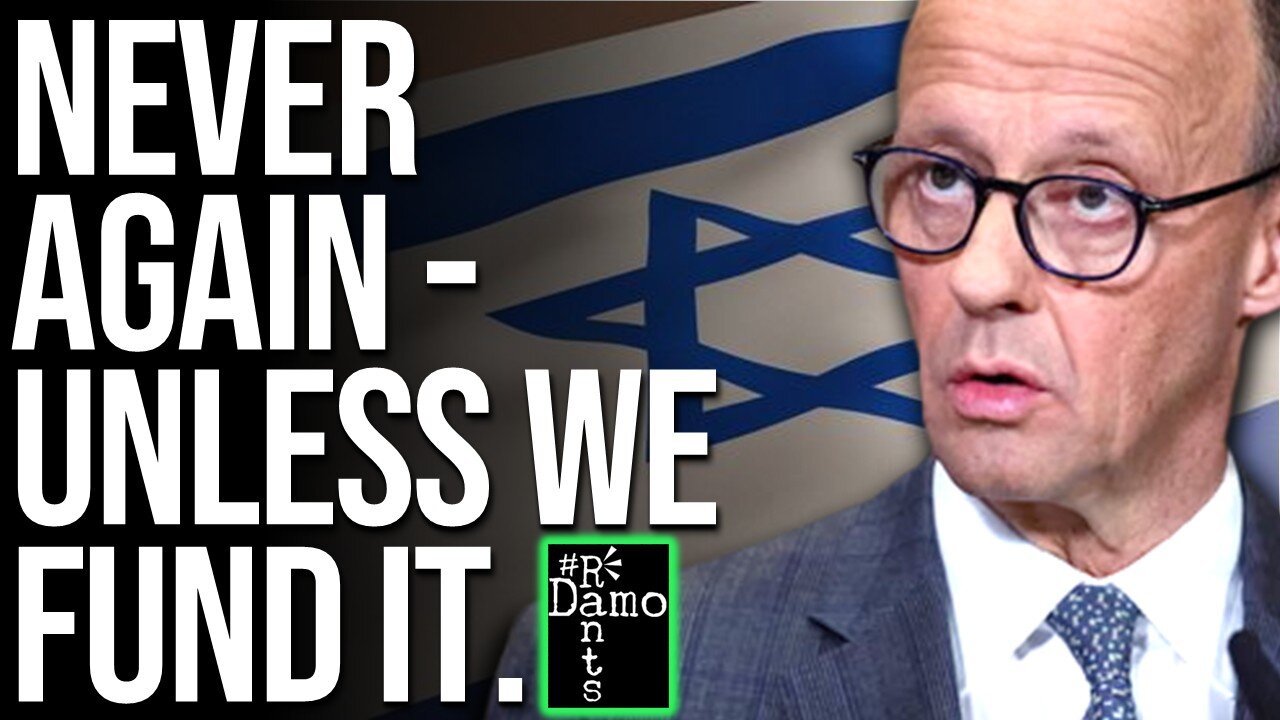Premium Only Content

Criticising Netanyahu Is Apparently Illegal in Germany!
Right, so Germany just criminalised a question. Not hate speech, not incitement, not a threat — a question. An eighty-four-year-old former lawmaker, Jürgen Todenhöfer, asked Benjamin Netanyahu, via social media, whether his conscience ever protested when he inflicted on Palestinians the same horrors the Nazis inflicted on Jews. Within days, prosecutors opened a case for Volksverhetzung — incitement to hatred — and police raided his home, seizing phones and computers. He says they’d been watching him for weeks. This is where Germany’s supposed morality and its memory law finally turns into complete farce. The state that claims to have learned from fascism now sends police to pensioners’ flats for comparing fascism to anything happening now. A law written to silence Nazi propaganda is being used to silence those warning that history is repeating in plain sight. That’s not memory; that’s censorship with a memorial plaque slapped on it. Since when did it become illegal to criticise Benjamin Netanyahu?
Right so free speech in Germany, already having been under considerable strain where the issue of Israel and Gaza are concerned, truly met its test when police raided an eighty-four-year-old man’s home over a tweet — and failed it. Jürgen Todenhöfer, the former German lawmaker who had served eighteen years in the Bundestag, had asked Benjamin Netanyahu whether his conscience never objected when he inflicted on Palestinians the same horrors the Nazis inflicted on the Jews. That line, posted to X, was enough to trigger a criminal investigation for Volksverhetzung—incitement to hatred—under Section 130 of Germany’s criminal code. Police seized his phones and computers. Todenhöfer said his apartment had been under surveillance. When asked for comment, he replied that if a prison sentence followed, it would be an honour to serve it for the cause of peace and freedom in Palestine. That moment ended the assumption that post-war Germany’s commitment to free speech was secure. From that point, the reality was visible: criticism of Israeli policy that crosses the moral boundary of Germany’s state memory will be treated as criminal speech.
Section 130 was created to stop Nazi propaganda and Holocaust denial. Its third paragraph penalises the approval, denial, or trivialisation of Nazi genocide where such statements disturb public peace. The statute does not forbid historical analogy; it forbids denial. Yet prosecutors have built practice around the idea that any comparison between Nazi crimes and Israeli actions is by definition trivialisation. That reading is not required by the text of the law. It is a discretionary extension, and it functions to protect political alignment rather than historical truth.
The Todenhöfer investigation exposes the structure behind that shift. In 2010 Angela Merkel told the Knesset that Israel’s security is part of Germany’s Staatsräson—its reason of state. Successive governments have treated that phrase not as diplomacy but as doctrine. The result is a permanent contradiction. Germany is bound by the Genocide Convention to prevent and not assist mass atrocities, yet its political identity demands solidarity with Israel regardless of circumstance. When those two imperatives collide, Staatsräson wins.
The International Court of Justice documented this collision in April of last year. Nicaragua filed a case accusing Germany of aiding and abetting genocide in Gaza by continuing to arm Israel. The same accusation is inferred in Francesca Albanese’s new report where she names 63 countries of complicity, Germany among them. The court refused to impose interim measures but kept the case open. That means the judges did not exonerate Germany; they chose not to order an immediate halt to exports while they examine the merits. Berlin’s government presented that limited ruling as vindication. But it wasn’t. The question of complicity remains before the court and actually this case is back in the news now as I covered in another video the other day.
Germany’s arms-export record is public though. The Federal Ministry for Economic Affairs authorised about €326 million in military sales to Israel in 2023, roughly ten times the previous year. The approvals covered ammunition, weapons components, and naval equipment. Between October 2023 and May of this year, total licences reached about €485 million. So even as the UN and major human-rights organisations warned that Israel’s actions in Gaza amounted to crimes against humanity, Berlin continued to deliver matériel.
Amnesty International concluded in 2022 that Israel enforces a system of apartheid against Palestinians. B’Tselem’s position, published in 2021 and reaffirmed since, is that Israel maintains a regime of Zionist supremacy from the Jordan River to the Mediterranean Sea. In March of last year, UN Special Rapporteur Francesca Albanese delivered a report titled “Anatomy of a Genocide,” finding reasonable grounds to believe Israel was committing genocidal acts under the Convention and of course she’s gone on to write that later assessment, Gaza Genocide: A Collective Crime, that has currently been in the news this week. These are formal institutional findings.
Inside Germany, a corresponding contraction of civil space has been recorded. Human Rights Watch documented at least ten major bans on pro-Palestinian demonstrations since October 2023. UN experts in October 2025 urged the government to end criminalisation of non-violent protest and police violence against demonstrators. Artists and academics critical of Israel have been disinvited or lost funding. These are documented events. They form the backdrop to the Todenhöfer raid. His prosecution is not an isolated excess; it is part of a broader policy environment where dissent on Palestine is treated as disorder in and of itself.
Todenhöfer did not deny the Holocaust. He argued that a state born from genocide is reproducing its logic. German prosecutors claim that such a comparison “trivialises” Nazi crimes. The legal text does not support that claim though; the selective interpretation of it does. The purpose of the interpretation is to maintain a moral monopoly. In the official framework, only the victims of 1945 can embody ultimate suffering, and only the state of Israel can represent their security. To suggest that this state is now committing atrocities is therefore treated as being tantamount to blasphemy.
When the police execute a raid on that basis, the line between public order and political policing disappears. Officials insist that criticism of Israel is still legal. The pattern of enforcement shows otherwise. Bans, raids, and investigations are all aimed at critics of Israeli policy. The optics matter more than the legal theory. In practice, criticism that strikes the wrong historical nerve is handled as a criminal matter. That is how self-censorship takes hold.
Germany’s role as an arms supplier ties this domestic censorship to international responsibility. Article III(e) of the Genocide Convention makes complicity a crime. The ICJ’s April 2024 order confirmed that the risk of genocide in Gaza is plausible and that third states must act to prevent it. Germany did not stop exports until August of this year, and then only partially. The record from 2023 through mid-2025 cannot be erased. The timing aligns with the period of the highest civilian death tolls in Gaza.
The memory law and the export policy are two arms of the same structure. One controls language; the other moves weapons. Both operate under the same doctrine of Staatsräson. The law defines what can be said; the export system defines what can be done. Together they show a state using its historical guilt as a rationale for silence and complicity. The more Germany arms Israel therefore, the less it can tolerate speech that names what those weapons are doing.
Todenhöfer’s political background underscores the point. He is not a fringe figure. He served in parliament for nearly two decades as a member of the governing party. The investigation into him sends a message that seniority and public service do not protect against enforcement when the subject is Israel. His response—that serving time would be an honour—was not rhetoric. It was a refusal to submit to the doctrine that equates solidarity with Israel to moral virtue.
Germany’s Basic Law guarantees freedom of expression in Article 5. Section 130 places limits on that freedom to preserve public peace. The purpose was to prevent a return to fascist agitation. Applying it to a statement about a foreign government is a total distortion therefore. The legal wording is fixed; the interpretation has changed. The difference reveals how power works through law. By expanding the meaning of “public peace” to include the emotional comfort of the state’s foreign-policy narrative, prosecutors have turned a safeguard of democracy into a tool of conformity.
Back in July, Germany’s chancellor publicly vowed to continue arms deliveries to Israel. A few weeks later, under growing diplomatic pressure, the government announced it would halt exports that could be used directly in Gaza. The official statement framed the decision as precautionary, not moral. The scope was narrow, the timing late. The policy shift acknowledged a problem only after the ICJ proceedings and public criticism made denial impossible. It did not address the prior transfers or the ongoing investigation of citizens who opposed them.
Human Rights Watch’s report adds another layer to this as well: Germany’s new citizenship law requires applicants to affirm Israel’s right to exist. That condition links access to nationality to endorsement of foreign policy. It fuses personal status with allegiance to Staatsräson. A society that treats such allegiance as a prerequisite for belonging is not neutral, it has legislated that away. It is a state where historical doctrine outranks individual conscience.
The state’s justification is consistent: it claims that because of its history, Germany must maintain exceptional caution about antisemitism. In practice, that caution has been redirected into suppression of criticism of a government under investigation for mass atrocities. The historical reflex has become moral paralysis. The law now enforces silence where it once promised vigilance.
Internationally, Germany’s stance has consequences. Many states in the Global South view its position as hypocrisy. Germany advocates a rules-based order yet exempts its allies from those rules. Within Europe, other states are questioning unconditional support for Israel. The result is diplomatic isolation on moral grounds. Germany’s claim to moral leadership, built on post-war atonement, is eroding under the weight of its own double standards.
Younger Germans are also rejecting the inherited guilt reflex. They see that the state uses memory not to educate but to police. For them, solidarity with Palestinians is not a betrayal of remembrance but its continuation. They can see that the vow of “Never again” has been reduced to a national slogan deployed selectively. The generational shift is visible in protest movements, academic debates, and cultural production and the sheer violence with how they get policed at times. The government’s reliance on coercion to contain it shows fear, not confidence.
This brings the issue back to sovereignty and power. Sovereignty belongs to citizens who exercise moral judgment and speech. Power belongs to the state that decides which judgments and which speech are permissible. Germany’s balance between the two has completely collapsed. Sovereignty now yields to power whenever Israel is involved. The Todenhöfer case is evidence, not metaphor. It shows that the state will enter private homes and seize property to protect an external alliance from domestic criticism.
And the consequence of that is predictable. A country that criminalises dissent on behalf of an ally accused of genocide cannot claim moral neutrality. When Germany marks Holocaust memorials with one hand and signs off weapons for Israel with the other, the hypocrisy isn’t hidden in speeches — it’s written in the export figures. When the same state sends police to raid an eighty-four-year-old for pointing out that history is repeating itself, that hypocrisy stops being moral failure and becomes official policy. They didn’t slip. They chose. The German government has been warned repeatedly—by the ICJ order, by UN rapporteurs, by rights organisations—that continuing exports risks complicity. It has continued anyway. It has been told that policing non-violent protest violates international standards. It has continued anyway. The pattern is deliberate. The state is acting on the calculation that moral authority built over decades can absorb the damage. Well, the calculation is wrong. Authority built on denial of repetition cannot survive evidence of it.
The record is already fixed. The export licences, the ICJ docket, the raids, the public statements—all exist in official archives. They will outlast the current government and the current moral line. When historians read them, the distinction between protecting Israel and protecting impunity will not hold. The raid on Todenhöfer will stand as proof that Germany chose conformity over conscience.
There is one more fact that must be stated here too. In today’s Germany, asking the wrong question about Benjamin Netanyahu can now bring the police to your door. That is not an exaggeration; it is what has already now happened. Imagine such a thing being illegal? It tells you what the state now considers dangerous: not hatred, not violence, but memory applied universally regardless of current affairs and the hypocrisy it exposes.
Germany built its post-war legitimacy on the promise that remembrance would prevent repetition. The law that once defended that promise is now being used to defend those accused of breaking it.
For more on Nicaragua’s case against Germany which is back in the news again, back at the ICJ, do check out this video recommendation here as your suggested next watch.
Please do also hit like, share and subscribe if you haven’t done so already so as to ensure you don’t miss out on all new daily content as well as spreading the word and helping to support the channel at the same time which is very much appreciated, holding power to account for ordinary working class people and I will hopefully catch you on the next vid. Cheers folks.
-
 17:17
17:17
Lady Decade
1 day ago $6.12 earnedMortal Kombat Legacy Kollection is Causing Outrage
47K8 -
 35:51
35:51
Athlete & Artist Show
1 day ago $11.13 earnedIs Ryan Smith The Best Owner In The NHL?
65.3K6 -
 22:56
22:56
American Thought Leaders
2 days agoCharles Murray: I Thought Religion Was Irrelevant to Me. I Was Wrong.
57.6K30 -
 36:22
36:22
Brad Owen Poker
11 hours agoGIGANTIC $17,000+ Pot In BOBBY’S ROOM! TRAPPING Top Pro w/FULL HOUSE!! Big Win! Poker Vlog Ep 326
66K3 -
 3:53
3:53
GreenMan Studio
1 day agoRUMBLE RUNDOWN: DREAM HACK SPECIAL W/Greenman Reports
54.8K10 -
 1:28
1:28
Damon Imani
2 days agoThey Laughed at Trump’s Cognitive Test — Damon Made Them REGRET It!
54.2K36 -
 9:14
9:14
Freedom Frontline
1 day agoAdam Schiff PANICS As Eric Schmitt Exposes His Dirty Lies LIVE
36.2K80 -
 10:32
10:32
GBGunsRumble
1 day agoGBGuns Armory Ep 153 Adler Arms AD-9`
24.2K2 -
 35:53
35:53
Degenerate Plays
10 hours ago $1.06 earnedRuckus Randy And Repair Ronald (Socks On) - Call of Duty: Modern Warfare 2 (2009) : Part 7
16.3K2 -
 38:35
38:35
Stephen Gardner
1 day ago🔥What JUST leaked out of Congress. PROVES Trump RIGHT!!
109K147